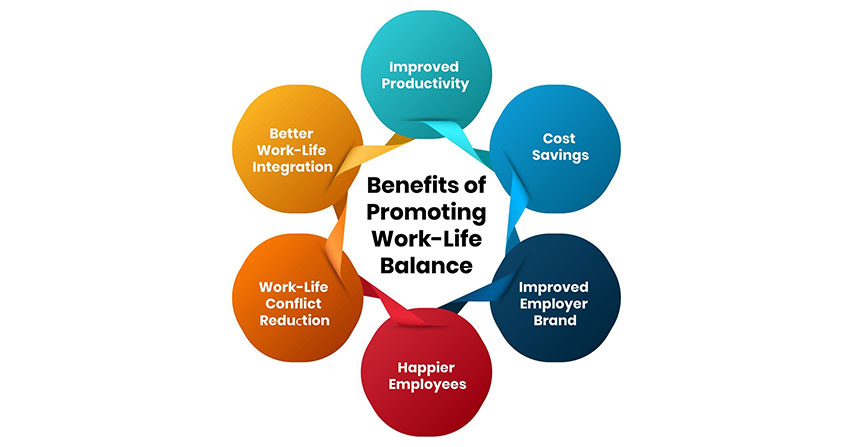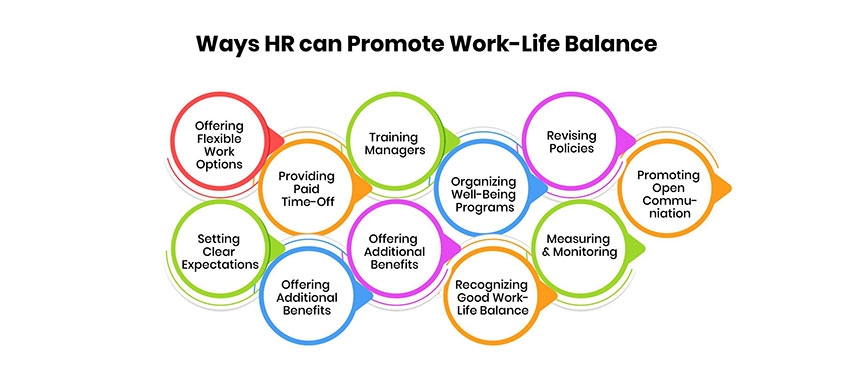
The corporate world often makes it challenging for employees to find harmony between their work responsibilities and personal commitments. However, maintaining a satisfactory work-life balance is important not only for individual well-being but also business success. When people feel fairly treated and supported in managing multiple aspects of their lives, they tend to be more engaged, productive, and loyal to their organizations. This is where human resources (HR) play a crucial role.
This article discusses how HR can help employees achieve a healthier balance between their professional and personal lives through flexible work policies, wellness initiatives, leadership buy-in, and more.
Before delving into the role of HR, it is important to understand the concept of work-life balance. Often used interchangeably with work-life harmony or integration, work-life balance refers to achieving equilibrium between the responsibilities associated with one's job and personal or family life.
It involves being able to effectively manage time and commitments between both domains in a manner that leads to enhanced well-being, satisfaction, and productivity. A balanced lifestyle contributes to reduced stress levels, increased engagement at work, better health outcomes, and improved retention rates for organizations.
However, attaining work-life balance can prove challenging. Constant connectivity through mobile devices and laptops has blurred boundaries between professional and personal spheres. Long working hours, heavy workloads, and inflexible schedules leave little room for other pursuits. Lack of institutional support through relevant policies or supervisor guidance also hinders achieving harmony.
This is where the HR function becomes crucial. As the custodians of people practices, HR professionals are well-positioned to introduce solutions, programs, and culture changes enabling employees to seamlessly blend their work and personal commitments.
There are several benefits of promoting work-life balance:

As the function responsible for people strategies, HR is in a unique position to influence company culture and implement programs that facilitate work-life integration. Through thoughtful policies, perks, and practices, HR teams can help busy professionals avoid burnout while still meeting business objectives. Some key ways HR promotes work-life balance include:
By offering flexible schedules, remote working options, and Compressed workweeks, employees gain autonomy over how and when they fulfill their duties. This arrangement reduces stress as people can better align their work hours to meet personal commitments like family care.
Research proves flexible work boosts job satisfaction and worker retention. It also drives higher performance as employees feel happier and less distracted. Ensuring managers embrace flexible cultures is important for the arrangements to benefit both parties optimally.
HR assists supervisors in implementing tools and guidelines that prevent constant work overflow. For example, calendar coordination helps avoid unnecessary meetings. Setting clear expectations on working hours and response times prevents "always-on" mentalities from forming.
Evaluating workload distribution ensures fair burdens, across teams. Promoting the use of task management software also supports personal organization. Such measures safeguard people's non-work hours and ensure they remain genuinely off-work.
Beyond physical wellness perks, HR spearheads mental health awareness programs. They provide counseling, meditation sessions, or online coachings to help deal with job pressures. Wellness challenges and financial rewards motivate a work-life balance focused lifestyle.
Leave policies encourage people to rest without work worries during vacations. Support groups for new parents or caregivers offer needed community and resources too. With active self-care promotion, employees feel enabled to perform optimally without compromising their well-roundedness.
HR leads the way by role-modeling healthy boundaries themselves. For instance, avoiding emails after a certain hour sends signals that relaxation time matters. Recognizing high-performers who prioritize lifestyle outside office inspires others to follow balanced routines without performance anxieties.
Transparency around senior management's personal commitments builds a psychologically safe environment where employees feel comfortable doing the same. Authentic priority-setting from top establishes balanced priorities as the cultural norm rather than an exception.
HR regularly gauges employee sentiments, retention rates, sick leaves, and engagement levels to solve potential issues. Anonymous climate surveys draw insights around workload management, manager support, and flexibility adoption in different teams. Qualitative interviews understand personal experiences and suggestions for enhancing current policies.
Data-backed recommendations ensure continual enhancements stay relevant to evolving needs. Feedback also strengthens manager buy-in by highlighting work-life balance's quantitative benefits.
In summary, organizations rely on their people assets more than ever before. HR plays an important role in fostering cultures where individuals feel valued holistically rather than as mere cogs in the productivity wheel. Through thoughtful initiatives focused on personal well-roundedness, HR sets the foundation for engaged and committed workforces - yielding crucial long-term gains for both employee wellness and business performance.
There are several ways HR departments can promote work-life balance:

Promoting work-life balance has become an important responsibility for modern organizations. HR plays a pivotal role in creating a culture where employees feel empowered to nurture their well-being. By offering the right opportunities, support, and resources, HR can help employees achieve harmony between their personal and professional lives. A healthy, balanced, and engaged workforce is essential for organizational success, sustainability, and growth. Overall, work-life balance should be an integral part of the employee experience, and HR must advocate for it.